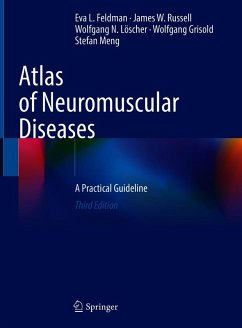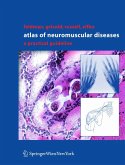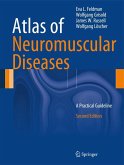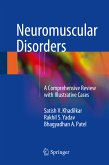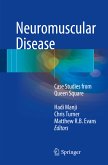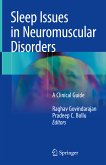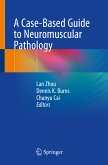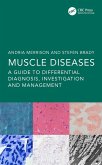Atlas of Neuromuscular Diseases (eBook, PDF)
A Practical Guideline


Alle Infos zum eBook verschenken

Atlas of Neuromuscular Diseases (eBook, PDF)
A Practical Guideline
- Format: PDF
- Merkliste
- Auf die Merkliste
- Bewerten Bewerten
- Teilen
- Produkt teilen
- Produkterinnerung
- Produkterinnerung

Hier können Sie sich einloggen

Bitte loggen Sie sich zunächst in Ihr Kundenkonto ein oder registrieren Sie sich bei bücher.de, um das eBook-Abo tolino select nutzen zu können.
This atlas offers a comprehensive overview of neuromuscular diseases. It discusses all aspects of neuromuscular disorders, including general tools, the cranial and spinal nerves, the nerve plexus, peripheral nerves, mono- and polyneuropathies, entrapment syndromes, the neuromuscular junction, motor neuron diseases, muscle disease, and autonomic involvement.
Each chapter is structured into the following sections: anatomy, symptoms, signs, pathogenesis, diagnosis and differential diagnosis, therapy, and prognosis. The diagnostic tools used for neuromuscular disease are explained, and the…mehr
- Geräte: PC
- ohne Kopierschutz
- eBook Hilfe
- Größe: 35.03MB
![Atlas of Neuromuscular Diseases (eBook, PDF) Atlas of Neuromuscular Diseases (eBook, PDF)]() Eva L. FeldmanAtlas of Neuromuscular Diseases (eBook, PDF)209,95 €
Eva L. FeldmanAtlas of Neuromuscular Diseases (eBook, PDF)209,95 €![Atlas of Neuromuscular Diseases (eBook, PDF) Atlas of Neuromuscular Diseases (eBook, PDF)]() Eva L. FeldmanAtlas of Neuromuscular Diseases (eBook, PDF)105,95 €
Eva L. FeldmanAtlas of Neuromuscular Diseases (eBook, PDF)105,95 €![Neuromuscular Disorders (eBook, PDF) Neuromuscular Disorders (eBook, PDF)]() Satish V. KhadilkarNeuromuscular Disorders (eBook, PDF)97,95 €
Satish V. KhadilkarNeuromuscular Disorders (eBook, PDF)97,95 €![Neuromuscular Disease (eBook, PDF) Neuromuscular Disease (eBook, PDF)]() Neuromuscular Disease (eBook, PDF)61,95 €
Neuromuscular Disease (eBook, PDF)61,95 €![Sleep Issues in Neuromuscular Disorders (eBook, PDF) Sleep Issues in Neuromuscular Disorders (eBook, PDF)]() Sleep Issues in Neuromuscular Disorders (eBook, PDF)53,95 €
Sleep Issues in Neuromuscular Disorders (eBook, PDF)53,95 €![A Case-Based Guide to Neuromuscular Pathology (eBook, PDF) A Case-Based Guide to Neuromuscular Pathology (eBook, PDF)]() A Case-Based Guide to Neuromuscular Pathology (eBook, PDF)97,95 €
A Case-Based Guide to Neuromuscular Pathology (eBook, PDF)97,95 €![Muscle Diseases (eBook, PDF) Muscle Diseases (eBook, PDF)]() Muscle Diseases (eBook, PDF)65,95 €
Muscle Diseases (eBook, PDF)65,95 €-
-
-
Each chapter is structured into the following sections: anatomy, symptoms, signs, pathogenesis, diagnosis and differential diagnosis, therapy, and prognosis. The diagnostic tools used for neuromuscular disease are explained, and the therapeutic options for each disease are described.
This updated third edition includes new chapters addressing a range of topics: from histology to molecular mechanisms, genetic aspects, the mechanisms of emerging new therapies, neuroimaging, neuromuscular disease, and new pathogenic mechanisms.
The book aims to be a useful companion for neuromuscular disease. The homogenous structure, illustrations with figures, and representative images makes the atlas easy to read and helpful in understanding neuromuscular problems.
Dieser Download kann aus rechtlichen Gründen nur mit Rechnungsadresse in A, B, BG, CY, CZ, D, DK, EW, E, FIN, F, GR, HR, H, IRL, I, LT, L, LR, M, NL, PL, P, R, S, SLO, SK ausgeliefert werden.
Hinweis: Dieser Artikel kann nur an eine deutsche Lieferadresse ausgeliefert werden.
- Produktdetails
- Verlag: Springer International Publishing
- Seitenzahl: 353
- Erscheinungstermin: 24. Februar 2021
- Englisch
- ISBN-13: 9783030634490
- Artikelnr.: 61246438
- Verlag: Springer International Publishing
- Seitenzahl: 353
- Erscheinungstermin: 24. Februar 2021
- Englisch
- ISBN-13: 9783030634490
- Artikelnr.: 61246438
- Herstellerkennzeichnung Die Herstellerinformationen sind derzeit nicht verfügbar.
Dr. James Russell is Head of the Neuromuscular Division, Vice for Chair for Research, and Director of the Peripheral Neuropathy Center in the Department of Neurology. He completed his neurology residency at the University of Iowa and completed training in neuromuscular/peripheral nerve disease at the Mayo Clinic Rochester. After further research training at the Mayo Clinic and the National Institutes of Health, Dr. Russell then joined the faculty at the University of Michigan where he was Associate Professor with tenure, and Director of the Veterans Affairs Medical Center (VAMC) Autonomic and Clinical Electrophysiology Laboratory. Dr. Russell joined the University of Maryland Medical Center in 2006, where he is Professor of Neurology, Anatomy and Neurobiology and Vice Chair for Research. He is board certified in Neurology, Clinical Neurophysiology, and Autonomic Disorders. He holds a masters degree in Clinical Research and Trial Design from the University of Michigan. Dr. Russell is a Fellow of the American Neurological Association, the American Academy of Neurology, the American Association of Neuromuscular and Electrodiagnostic Medicine, the Royal College of Physicians, and the American College of Physicians. He has an active neuromuscular practice as well as research programin peripheral neuropathy. Dr. Russell's laboratory has as its research focus the understanding of the mechanism/s and treatment of diabetic neuropathy. His laboratory is interested in developing strategies to prevent of reverse neuropathy. In translational research, the laboratory is currently examining pathways of oxidative and mitochondrial injury in the peripheral nervous system, and mechanisms to prevent or reverse cellular injury. Understanding these basic mechanisms of glucose-induced injury in the peripheral nerve will allow a more a rational design of therapies aimed at ameliorating diabetic neuropathy. In clinical research, the research group is determining the effect of lifestyle interventions on autonomic and somatic neuropathy in subjects with neuropathy associated with pre-diabetes and diabetes. This research is aimed at developing improved diagnosis and new treatments for peripheral neuropathies. Dr. Russell has clinical research interests in neuromuscular diseases, specifically in the study of peripheral neuropathies. He has active clinical research interests in the pathogenesis and treatment of neuropathy in diabetes and impaired glucose tolerance, and in inflammatory neuropathies. He also has clinical and research interests in autonomic neuropathies. He directs the Autonomic Nervous System Disorders Laboratory at the University of Maryland.
Wolfgang Löscher, MD PhD, graduated from the School of Medicine, Karl-Franzens University, Graz, Austria in 1988. He was a Research Assistant at the Department of Physiology in Graz from 1988 - 1993, a trainee in Neurology at the University Departments of Neurology Graz and Salzburg, and then a Research fellow at the Department of Neuroscience, Karolinska Institute, Stockholm, Sweden in 1994 and 1995. In December 1995, he received his PhD in Neuroscience from the Karolinska Institute, Stockholm, Sweden. Professor Löscher has been a board certified neurologist since 1998. Since 2001, he hasbeen an associate professor at the Department of Neurology, Innsbruck Medical University, Innsbruck, Austria, a certified EMG and EVP instructor, and Head of the Neuromuscular Unit, EMG, and EP-laboratory. He is also currently head of the Neuromuscular working group of the Austrian Association of Neurology (ÖGN). His clinical and research interests focus on the clinical aspects and genetics of neuromuscular disorders and clinical neurophysiology.
Univ. Prof. Dr. Wolfgang Grisold, is a specialist for neurology and psychiatry. Special interests are general neurology, neurooncology, neuromuscular disease, education, and patient related issues such as pain, palliative care, and advocacy. He has experience in hospital practice, research, and private practice. He has participated in EU projects on paraneoplastic syndromes. His scientific focus is on the effect of cancer on the peripheral nervous system, in particular peripheral neurotoxicity and the direct effects of cancer. In regard to neuromuscular disease, he has experience with neuromuscular diseases, such as autoimmune diseases, in particular myasthenia gravis and inflammatory neuropathies. He has much experience in neuromuscular clinics, and practices electrophysiology. He is involved in several international neurological societies and is the secretary general of the World Federation of Neurology. He has organized several international neurological congresses, among them the EANO congress in 2006, and the ICNMD 2018. He currently has more than 600 publications, 250 pubmed quoted, and 7 books. (Neuromuskuläre Läsionen bei Malignomen (German); Praktische Neuroonkologie (German); Atlas of neuromuscular disease, 2 editions; Neuromuscular complications of cancer; and Neuro-Oncology, Part I and II, Volume 105, jointly with R. Soffietti, in 2012; Advocacy in Neurology, 2019.)
Dr. Stefan Meng is a radiologist in the Hanusch Hospital, Vienna, and in a private office. In his clinical workhe is specialized in ultrasound. Additionally, Dr. Meng heads an ex-vivo ultrasound lab at the Center for Anatomy and Cell Biology at the Medical University of Vienna. His clinical and experimental research is focused on neuromuscular and head and neck imaging. He is member of the board of the Austrian Society for Ultrasound in Medicine and organizes pre- and postgraduate ultrasound courses.
